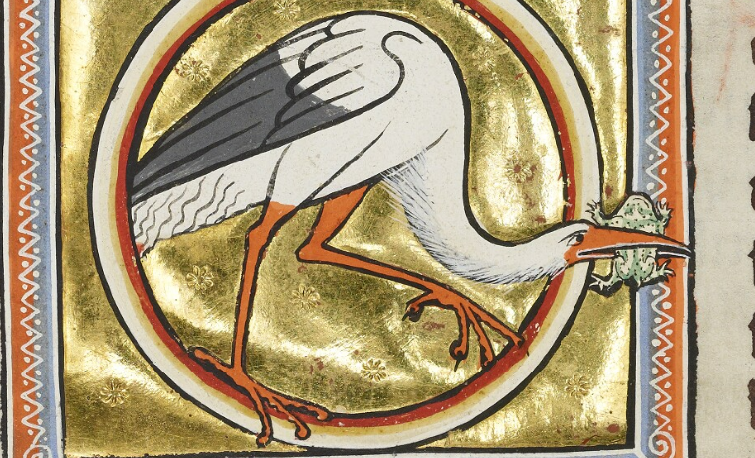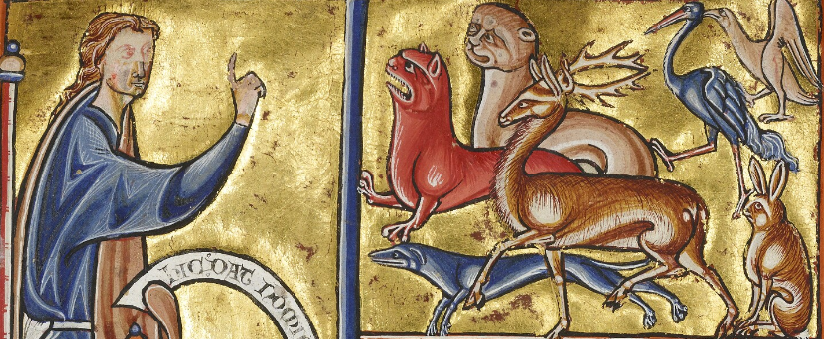February marks LGBTQ+ history month in the UK. Alcuin, who frequently wrote of his male colleagues with romantic affection, is celebrated by many LGBTQ+ scholars as part of our history. Here are some appropriate words from the 8th Century:
Haec ideo, frater, tibi scripsi, ut scias, si tamen scire potes, qua te caritate diligo; nam me ipsum fateor edicere non posse – fordan etiam nec tu, qua me diligas – Deus scit, qui hanc infudit cordibus nostris.
[I have written you this, my brother, so that you might know how much I love you; for I confess that I cannot express it – and perhaps you too cannot say how much you love me – but God, who poured this love into our hearts, knows it, Ep. 17]
In the spirit of uplifting LGBTQ+ scholars and scholarship, I’d like to bring special attention to one of our newest additions: the Queer and Trans Medievalisms Reading and Research Group, which meets at 3pm on Monday at Univ College, 12 Merton St Room 2 to discuss the wonderful Yde et Olive! All are welcome!
On another note, please keep in mind that over the coming weeks, many seminars, reading groups etc. may be cancelled or postponed at late notice in solidarity with UCU strike action. For all the latest updates, please check our Calendar (on the right hand side of our blog) or Twitter (@OxMedStud). If you are cancelling an event, please let me know so that we can update the community!
ANNOUNCEMENTS:
- Registration for the Memorial Event for Nigel F. Palmer is open. To celebrate the life and scholarship of Nigel F. Palmer, Professor of German Medieval Literary and Linguistic Studies at the University of Oxford, Faculty, College and academic community will honour his memory with a symposium, to be held at the Taylorian and the Weston Library on 19-20 May 2023.
- Piers Plowman performance on Saturday 11 February, 2-3pm, in St Edmund Hall! This coincides with National Garden opening of the beautiful grounds. The charity donation of £4 includes entry to the play – or write a review (speak to the OBS members at the entrance about how to do this) and you get in for free!
- The Dark Archives 19-21 Proceedings: Voyages into the Medieval Unread and Unreadable are going to print this week! The Dark Archives conferences examine the praxis of digitisation and its impact on medieval studies worldwide. To read more about the volume, see the blog post by Stephen Pink and Anthony John Lappin.
EVENTS THIS WEEK:
Monday 6th February:
- The Byzantine Graduate Seminar takes place at 12.30-2pm online via Zoom. This week’s speaker will be Daniel Alford (University of Oxford), Adults, Children and Other Animals: The Construction of the Zoroastrian Household. To register, please contact the organiser at james.cogbill@worc.ox.ac.uk.
- The Medieval Latin Manuscript Reading Group led by Matthew Holford and Andrew Dunning is meeting as usual via Teams from 1-2pm. We will start with natural history from a medieval encyclopaedia. Sign up for the mailing list to receive updates and the Teams invite, or contact matthew.holford@bodleian.ox.ac.uk or andrew.dunning@bodleian.ox.ac.uk for more information.
- The Queer and Trans Medievalisms Reading and Research Group meets at 3pm at Univ College, 12 Merton St Room 2. This week’s theme is Yde et Olive. All extremely welcome! To join the mailing list and get texts in advance, or if you have any questions, email rowan.wilson@univ.ox.ac.uk.
- The Medieval Archaeology Seminar meets at 3pm at the Institute of Archaeology, Lecture Room. This week’s speaker will be Prof. Oliver Creighton, University of Exeter, ‘Warhorse: The archaeology of horses in England, AD800-1600‘.
- The Medieval History Seminar takes place at 5pm in the Wharton Room, All Souls College and on Teams (Teams link here). This week’s speaker will be Justine Trombley (Durham), ‘Books and the Late Medieval Landscape of Heresy and Inquisition.’. The Teams session can be accessed by logging in to Teams with your .ox.ac.uk account and joining the group “Medieval History Research Seminar” (team code rmppucs). If you have any difficulties please email: medhistsem@history.ox.ac.uk
- The Lincoln Leads seminar takes place at 5.30–7pm at Oakeshott Room, Lincoln College. This week’s panel is ‘Love and Other Emotions’, and features Em Horne (MSt in English 650-1550) on emotionality in Old Icelandic Sagas. Book a free place here: https://www.eventbrite.co.uk/cc/lincoln-leads-2023-1539199.
Tuesday 7th February:
- The Europe in the Later Middle Ages Seminar will take place at 2–3.30pm in the New Seminar Room, St John’s College. Tea and coffee available from 1.45pm. This week’s speaker will be Cecilia Gaposchkin, Dartmouth, ‘Sacral Paris and the Capetians‘.
- A ‘Digital Hub’ event called ‘Digital Keys to Invisible Texts’ takes place at 5.30-7.30pm in Jesus College’s new Cheng Building, with Richard Ovenden, Dirk Van Hulle, and Mike Kestemont. Free registration via Eventbrite: https://www.eventbrite.co.uk/e/digital-keys-to-invisible-texts-tickets-488521088727
Wednesday 8th February:
- The Medieval German Graduate Seminar will meet at 11:15am in the island room of Oriel College for discussing Heinrich von Neustadt’s Apollonius von Tyrland. If you are interested to join, contact Henrike Lähnemann to be added to the teams chat.
- The Medieval Italian Seminar will take place at 2pm at Rees Davies Room, History Faculty. This week’s speaker will be Adele Curness, (Oxford, St John’s), ‘Calabrian Hagiography and Mediterranean Connectivity in the Long Tenth Century’.
- GLARE (Greek and Latin Reading Group) takes place at 4-5pm at Jesus College. Please meet at Jesus College Lodge. This week’s text will be Homer, Odyssey, ll. 23–50 & 465–503. All welcome to attend any and all sessions. For more details and specific readings each week, or to be added to the mailing list, email john.colley@jesus.ox.ac.uk or jenyth.evans@seh.ox.ac.uk.
- The Medieval Latin Document Reading Group meets on Teams at 4-5pm. We are currently focusing on medieval documents from New College’s archive as part of the cataloguing work being carried out there, so there will be a variety of hands, dates and types. A document is sent out in advance but homework is not expected. Contact Michael Stansfield (michael.stansfield@new.ox.ac.uk) for further details and the Teams link.
- The Late Antique and Byzantine Seminar takes place at 5pm at the Ioannou Centre for Classical and Byzantine Studies, 66 St Giles. This week’s speaker will be Yan Zaripov (St Hilda’s College), ‘Theodore Prodromos’ Epigrams on the Old and New Testament: Narrative, Rhetoric, and Classical Mimesis’.
- The Medieval English Research Seminar takes place at 5.15pm in Lecture Theatre 2, English Faculty, followed by a drinks reception. This week’s speaker will be Philip Knox (University of Cambridge), ‘Usk’s Books’. All welcome.
Thursday 9th February:
- The Oxford Medieval Commentary Network will meet at 12.45-2.15pm in Thatched Barn, Christ Church (by meadow entrance). Free lunch from 12.45, seminar paper begins at 1.15. Today’s speaker will be Jiani Sun, Oriel College, Oxford, ‘The Making of an Autobiography: Reading, Writing, and Shaping the Life of Solomon in Wisdom of Solomon 7–9′. Please direct all questions to cosima.gillhammer:chch.ox.ac.uk, or visit the website.
- The Celtic Seminar will not run today due to UCU strike action. The paper by Myriah Williams has been postponed to the autumn.
- The Medieval Visual Culture Seminar meets at 5.15pm at St Catherine’s College, Arumugam Building. This week’s speakers are Lauren Rozenberg University College London, ‘In the Flat Round: Brain Diagrams in Late Medieval Manuscripts‘ and Sergei Zotov, University of Warwick, ‘Christian Motifs in Fifteenth-Century Alchemical Iconography‘.
Friday 10th February:
- The Medievalist Coffee Morning takes place at 10:30-11.30am in the Visiting Scholars Centre in the Weston Library (access via the Readers Entrance on Museum Road: straight ahead and up two floors!). This week we’ll be treated to a number of Hebrew manuscripts by Dr Thea Gomelauri, among them Bodleian Library MS. Can. Or. 28, 34, 37, 41 and 94 – do come!
Saturday 11th February:
- A Fair Field of Folk will be performing The Potted B Text of PIERS PLOWMAN. Come and join our merveillous swevene, 2–3pm at St Edmund Hall, Broadbent Garden (behind the library church of St-Peter-in-the-East). Gardens open 2–5pm as part of the National Garden scheme. Ticket for the gardens £4.00 on the door, includes entrance to the play.
OPPORTUNITIES:
- The Vatican Film Library at Saint Louis University invites applications to short-term fellowship programs available for research in its collections. The library holds over 40,000 medieval and Renaissance manuscripts reproduced in microfilm and digital formats. Fellowships are available to graduate students and established scholars regardless of nationality. For further information on application details and submission deadlines, see our fellowship guidelines.
- Call for Submissions: The Database of Religious History. The Database of Religious History (DRH) is currently recruiting historians, archaeologists, and religious studies scholars in all areas of expertise (PhD students and above). If you have academic expertise in the history or anthropology of religion, please consider contributing to the DRH. In an effort to build the database in as swift a manner as possible, and improve the quality of any analyses produced with it, the DRH is offering $300 CAD honoraria for each completed entry. If you are a PhD candidate or above and would like to contribute an entry on any religious group, place, or text, please contact Dr. Ian Randall (irandall@mail.ubc.ca) or sign up for the database at https://religiondatabase.org/landing/get-involved and select Dr. Randall as your entry editor. For more information please see here.
- CFP: Priests and their Manuscripts in the Holy Land and Sinai (Vienna, 8–10 November 2023). Please send the title of your paper and an abstract (max. 300 words) to Giulia Rossetto (giulia.rossetto@oeaw.ac.at) no later than March 15, 2023. The speakers will be notified by April 15.For full details, see our blog.
I leave you with another quote from Alcuin’s letters, on the power of love, as a little preview for next week’s Valentine’s day:
Dulcedo sanctae dilectionis vestrae omnibus horis etiam et momentis aviditatem pectoris mei habundantur
[The sweetness of your righteous love makes the desire of my heart overflow every hour and every minute, Ep. 78]May love (of this medieval community and your research) make your heart overflow this week!

Ashmole Bestiary, Bodleian Library MS. Ashmole 1511, f. 66 v.
Viewable in full at Digital Bodleian


















